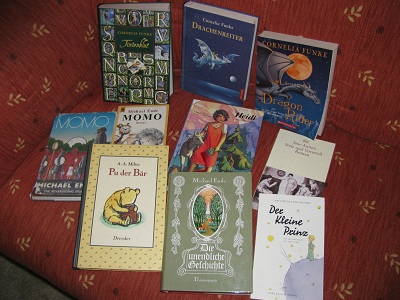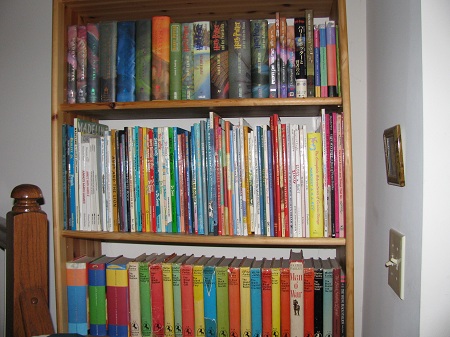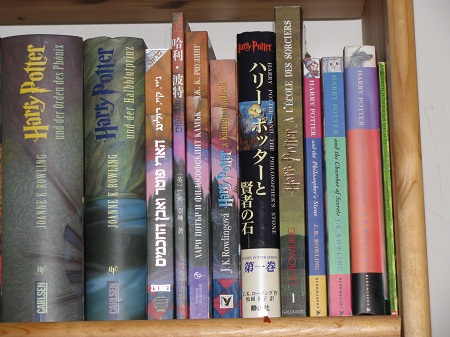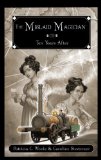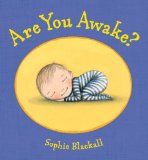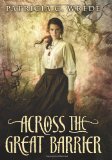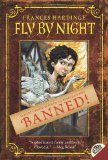Those who read my blog should know by now that Sonder is a German prefix meaning “special.” I put that statement at the bottom of every page.
You may also realize that I have a thing about my name. I get a thrill any time I see it in print, spelled correctly. All my years in school, teachers who had just met me would always, or it seemed always, read my name as “Sandy.” I had one Sunday School teacher who, for a few years, called me Sandra. I did not like him.
The story went that my parents named me “Sondy” instead of “Sandy” because they wanted to have a boy named “Randy,” and that would be too much alike. (And I do indeed have a little brother named Randy.) My mother’s mother had a piano student named “Sondra,” and they decided they liked the name and would use that. Some time or other, my Mom told me they expected me to go by Sondra, but they called me “Sondy,” and so that’s what I went by when I got to school age. If Sandra’s can go by Sandy, it seems perfectly logical for Sondra to go by Sondy, right?
But somehow, people can’t seem to read the name “Sondy.” They always seem to think they’re not seeing it right, or it’s spelled wrong or something. I also found that when I went by a display of Name souvenirs — like California license plates with people’s names, or necklaces with people’s names, or key chains, or whatever you might hope to find — well, there was never a Sondra or a Sondy in the crowd. I know. I always looked.
So, I got to Germany. I very very quickly spotted that Sonder is a prefix meaning “special.” There was a town relatively near us called Sonderhausen (“special houses”). I looked on a map for more Sonder towns, and about popped my eyes out when I discovered an actual village that shared my name. I dragged my family three hours to get a picture with the sign. (We went to a castle while we were at it, of course.)

Stores would offer a Sonderangebot (“special offer”). Of course, childishly, my very favorite German word quickly became Sonderfahrt (“special trip”).

I looked in my German dictionary for more Sonder words, knowing that in German, the dictionary will by no means list them all. I found some fun ones: Sonderaustellung, “special exhibit”; Sonderfall, “special case”; sonderlich, “remarkable”; Sondernummer, “special edition”; Sonderpreis, “special price”; Sonderstellung, “exceptional position”; Sonderurlaub, “emergency leave”; and Sonderzug, “special train.”
As I was so pleased to read all the ways Sonder means special, I was a bit embarrassed when I read the definition of Sonderling: “queer (or eccentric) fellow, crank.” But all my years in Germany, I never heard anyone use that word or saw it written, so I decided I could safely focus on the “special” meaning.
With all that, you can see why the name of my website was easy to choose. In fact, I talked about making a website called “Sonderbooks” for quite some time before I actually did it.
Okay, many years after starting my website, I attended the 2010 ALA Conference in Washington, DC. At the YA Coffee Klatch, I met James Kennedy.
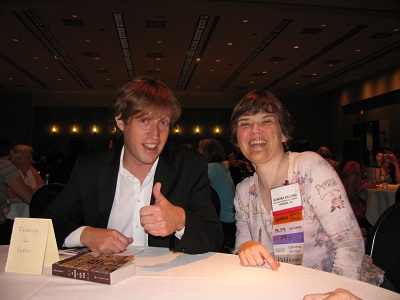
When James described his book, The Order of Odd-Fish, the sense of humor struck me as quirky and clever and delightful. I was sure my sons would love it, since it reminded me of Douglas Adams, so I bought a copy for my younger son’s 16th birthday.
Well, a year later, I was on my way to ALA Annual Conference again. My son still hadn’t read it, and I still hadn’t read it, but James Kennedy’s name was in the program, and I thought how I’d hate to meet him again without having read his book. So I brought it along and began it on the flight there, and finished it on the flight back.
As luck would have it, I did meet James again, this time at the Newbery Banquet. And I was able to tell him that I was reading his book!
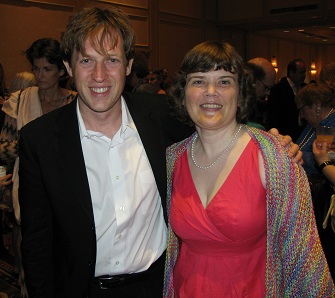
I also had the fun of tweeting my reactions as I finished the book while traveling. (Completely fun book!)
Okay, so a few months ago, James announced on his website that The Order of Odd-Fish was being translated into German.
Dear Reader, imagine my delight when I learned the title: Der Orden der Seltsamer Sonderlinge! Yes, that’s right! Remember the “queer or eccentric fellow” the “crank”? Seltsamer basically means “strange” and Sonderlinge is simply the plural form of that delightful word Sonderling. (By the way, I was very happy to learn that more modern dictionaries include the word “nerd” in the definition.)
Well, I expressed my delight via Twitter to James, and he very kindly promised me a German copy.
And it arrived last night! Actually, I wasn’t feeling well and didn’t check my mail the day before yesterday, so it may have come then. When I found it, I suddenly felt much better!

I was especially delighted that my son, who is in his fourth year of studying German, and has actually begun The Order of Odd-Fish now, snagged the German edition before I could look at it very hard. We looked up important things. Like, how did they translate “the Belgian Prankster”? Answer: der Belgische Scherzkeks. Looking up the parts of that word in my German dictionary, prankster is basically “joke-cookie.” Don’t you love those German compound words?
We both were compelled to read the jacket copy on the back aloud, and were both delighted with the parts we understood. For example, I quickly grasped “Jo trifft auf eine sprechende Riesenkakerlake,” which means “Jo met a giant talking cockroach.”
The first thing you notice about the German edition is that it looks much bigger than the English edition. Here’s another view that shows this even more clearly:

The English edition is 403 pages, but the German edition is 511. James put a note in the book suggesting that perhaps they added scenes when translating. That would be fun to discover, but I think a simple listing of random sentences will show a simple truth: German sentences take more space to write than English ones.
Let’s look at the first sentence:
“The desert was empty, as though a great drain had sucked the world underground.”
Auf Deutsch:
“Die Wüste war leer, als hätte ein gro?er Abfluss die Welt weggesaugt.”
Okay, that one does not prove my point. Let’s try another:
“A giant cockroach had walked into the room, three feet tall, wearing a purple velvet suit with a silk shirt, cravat, and bowler hat.”
Auf Deutsch:
“Eine gigantische Kakerlake hatte den Raum betreten. Sie war mindestens einen Meter fünfzig gro?, trug einen violetten Samtanzug, darunter ein Seidenhemd, eine Krawatte und einem Bowler auf dem Kopf.”
That one’s more what I expected. Though why do you suppose they had to mention he had the Bowler on his head (auf dem Kopf)? Maybe a Bowler isn’t always a hat?
Anyway, surely you can see how much fun this is going to be.
Now, I’m horrified as I write this to realize I never did review The Order of Odd-Fish. I’m pretty sure it got out of my big To-Review pile this summer when my son did decide to finally read it. So I’m going to remedy that soon. However, though I can read German, I don’t read it very fast, so it would take who-knows-how-long for me to read the whole book and then report back.
So. I foresee a continuing feature. I mean surely the first time I see Sonderling actually used in print, I simply HAVE to feature it on Sonderbooks? I think after each chapter, I hope about once a week, I will post about my journey through this translation. I’ll explore how they express different unusual concepts and anything else that strikes my fancy. Since the book is definitely quirky, I hope I can work in some quirky observations.
I hope that my readers will enjoy joining me on my Sonderfahrt through Der Orden der Seltsamer Sonderlinge!


